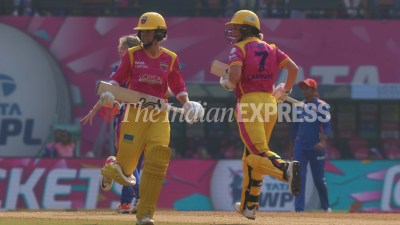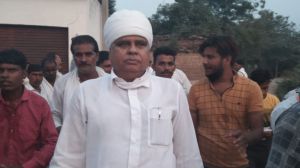Floyd Redux
It was four against nature at London8217;s Hyde Park on the evening of July 2, as history decided to turn on itself. After a bitter quarter...

It was four against nature at London8217;s Hyde Park on the evening of July 2, as history decided to turn on itself. After a bitter quarter century apart, Pink Floyd, arguably the most influential rock band ever, reunited.
The war between the band8217;s two protagonists, David Gilmour and Roger Waters, tore the band apart in 1981 after a spiteful, sour 8217;70s, which ironically produced some of their most enduring stuff, including The Dark Side Of The Moon and The Wall.
But as dusk fell over Bob Geldof8217;s Live 8 concert venue last Saturday, it seemed like 24 years had effortlessly been relegated to the realm of the impossible. The band8217;s guitarist Gilmour and frontman bassist Waters buried the hatchet and belted out more than 20 minutes of their most obvious favourites8212;this wasn8217;t an audience looking for innuendo. Nor were Pink Floyd fans in the crowd looking to see if they played some of their more eclectic and hallucinatory tunes from the late 1960s. It was 20 minutes of the most intense intrigue8212;to see if the band that gave the world psychedelic rock could still play together, still create the eerie, hypnotic lure that critics have called masochistic music.
Watching the concert on TV in New Delhi, thousands of miles away from the crazed crowds in London, I can assure you there was no hate on that stage. Sure, Gilmour, Waters, drummer Nick Mason and keyboard player Richard Wright did seem a bit bashful, even somewhat stiff, at the beginning, but it was first Breathe and then Money, their brilliantly caustic single about the evils of lucre from 19738217;s The Dark Side Of The Moon, that took it away.
In a statement before the show, Gilmour said, 8216;8216;Any squabbles Roger and the band have had in the past are so petty in this context, and if re-forming for this concert will help focus attention then it8217;s got to be worthwhile.8217;8217; And Waters shot back, 8216;8216;Being given the opportunity to put the band back together, even if it8217;s only for a few numbers, is a big bonus.8217;8217;
Playing to the backdrop of a giant flying pig, the inscrutable image of their low-key 1978 masterpiece Animals, Waters and Gilmour played to each other like they had never spent a day apart from the Abbey Road studios. Historically, the voices of the two frontmen were always jarringly different, while Gilmour8217;s voice soothed, calmed and comforted, Waters8217; vocal style was dark, brooding, softly dangerous. Over the drone of Gilmour8217;s unmistakable guitar style, with hyperbolic licks and yowls, Pink Floyd8217;s astounding blend of innocent and scary had lost none of its menacing vitality.
The band then launched into their signature Wish You Were Here, the ghostly fourth track from their 1975 record of the same name. The song, as the band announced with pronounced grief, was written as a tribute to Roger 8216;Syd8217; Barrett, who co-founded Pink Floyd with Waters in 1965. After masterminding the band8217;s seminal 1967 debut record The Piper At The Gates Of Dawn, and erratically contributing to the following collection of odds and ends, Barrett was evicted from the band because of his drug addiction. He lives in Cambridge now, where he apparently grows fruit.
Pink Floyd ended their show with a song that seemed to epitomise the Waters-Gilmour war more than anything else. Comfortably Numb, primarily a Gilmour song, was included under much controversy on 19798217;s smash record The Wall, which was supposed to have been Waters8217; solo effort at a concept album. But the two shared the beauty with manifest graciousness, almost letting the other get ahead.
Nobody knows if Pink Floyd will reunite and tour the world. But it8217;s sometimes nice to think that if they do, they will have lost none of what they always had together.
- 01
- 02
- 03
- 04
- 05































